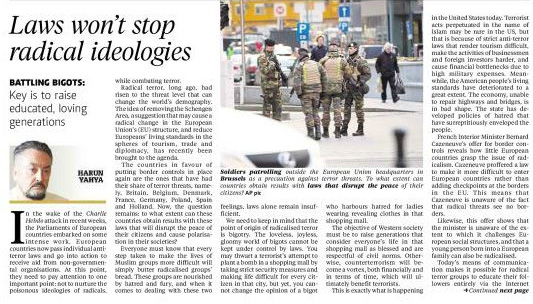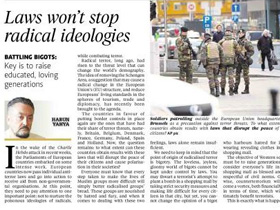
In the wake of the Charlie Hebdo attack in recent weeks, the parliaments of the European countries embarked on some intense work. The European countries now pass their individual anti -terror laws and go into action to receive aid from NGOs. At this point they need to pay attention to one important point; not to nurture the poisonous ideologies of radicals while combatting terror.
Radical terror long ago rose to the threat level that can change the world’s demography. The idea of removing the Schengen Zone, a suggestion that may cause a radical change in the EU’s structure, and reduce Europeans’ living standards in spheres of tourism, trade and diplomacy has recently been brought to the agenda. The countries in favor of putting border controls in place again are the ones that have had their share from terror threat; namely, Britain, Belgium, Denmark, France, Germany, Poland, Spain and Holland. Now the question remains; to what extent can these countries obtain results with these laws that will disrupt the peace of these countries’ citizens and cause polarization in these societies?
Everyone must know that every step taken to make the lives of Muslim groups more difficult will simply butter radicalized groups’ bread; these groups are nourished by hatred and fury, and when it comes to dealing with these two feelings, laws alone remain insufficient.
We need to keep in mind that the point of origin of radicalized terror is bigotry. The loveless, joyless, gloomy world of the bigots cannot be kept under control by laws. You may thwart a terrorist’s attempt of planting a bomb in a shopping mall by taking strict security measures and making life difficult for every citizen in that city, yet you cannot change the opinion of a bigot who harbors hatred for ladies wearing revealing clothes in that shopping mall.
The objective of Western society must be to raise generations considering everyone’s life in that shopping mall as blessed and respectful to civil norms. Otherwise, counter-terrorism would become a vortex both financially and in terms of time, which would ultimately benefit terrorists. This is what is exactly happening in the USA today: Terrorist acts perpetuated in the name of Islam may be very rare in the USA, but that is because of the strict anti-terror laws that render tourism difficult, make the activities of businessmen and foreign investors harder and cause financial bottlenecks due to its high military expenses. Meanwhile the American people’s living standards have deteriorated to a great extent. The economy, even unable to repair highways and bridges, is still in bad shape. The state has developed policies of hatred that have surreptitiously enveloped the people.
French Interior Minister Bernard Cazeneuve’s offer for border controls clearly reveals how little the European countries’ grasp the issue of radicalism. Cazeneuve proffered a law making it more difficult to enter the European countries rather than adding checkpoints on the borders within the EU. This means that Mr. Cazeneuve is unaware of the fact that radical threats see no borders. Likewise, this offer shows that the Minister is unaware of the extent to which it challenges European social structures, and that a young person born into a European family can also be radicalized. Today’s means of communication makes it possible for radical terror groups to educate their followers entirely over the Internet, and thus access every corner of the world in the ideological sense. The communist guerilla movement that appeared in 1950s in Cuba could recruit members by paying visits to the numerous and sundry mountain villages in Sierra Maestra; blockading these villages by the military could have slowed down the spread of the ideology. Alternatively, preventing the circulation of Sun Tzu’s books could have caused a setback in the training of guerilla fighters in Far East countries. Yet today, by means of the Internet, the highest mountain village in the world or the remotest island state is only a “click” away. It has also become evident that filtering the Internet does not stop access to information. Once a website is closed, another one appears right away on another address. Today people who are called “lone wolves” direct terrorist acts from their individual cells and they are dispersed homogeneously to almost all societies.
In the face of this threat, there exists only one workable method: Carrying out an intellectual struggle, putting the Internet, televisions and radios to better use than the radicals. If radicals have a thousand websites used for ideological purposes, we need to have tens of thousands of them that will propagate love, brotherhood and unity.
What the European states must do is to aid Muslim societies in developing a mindset that follows only the true teachings of Islam based solely on the Qur’an.
Turkey, a country which managed to establish a stable democratic foundation and a secular constitutional framework despite being one of the most populous Muslim nations, can help the West. If we consider Turkey’s success in keeping its youth safe from recruitment to terror groups, in its integration to a Western lifestyle on a comparative study among the European countries, we can see the positive results of centuries-long Islamic tradition and experience in youth redirection. Even though the European countries only have a minority of Muslims, their numbers of recruits to such groups exceed the numbers from Turkey, with its 99% Muslim population. In this effort, the country entitled to be Europe’s partner.
Adnan Oktar's piece on New Straits Times


